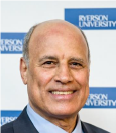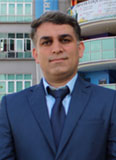Keynote Speakers/主讲嘉宾
Keynote Speakers/主讲嘉宾
Notice: The conference will be changed into ONLINE. To avoid health risks caused by the outbreak of the epidemic in China, the conference scheduled for Wuhan will be changed into online.

Prof. Said Easa
Ryerson University, Canada
Professor Said Easa is currently Professor of Civil Engineering, Ryerson University, Canada. He received his B.Sc. degree from Cairo University (Egypt) in 1972, M.Eng. degree from McMaster University (Canada) in 1976, and Ph.D. degree from University of California at Berkeley (U.S.) in 1982. He has served as Director of Quality Assurance of the Faculty of Engineering at Ryerson University (2010-2013), where he introduced the new accreditation system for graduate attributes. Prior to joining Ryerson University in 2000, he had taught at Lakehead University, Canada (1982-2000). Dr. Easa is Fellow of Canadian Academy of Engineering, Engineering Institute of Canada, and Canadian Society for Civil Engineering (CSCE). His research interests cover broad transportation areas, including planning, design, operation, and management. In particular, he has introduced novel approaches for safer and more efficient transportation infrastructure, including highway alignments, railway crossings, interchanges, intersections, and roundabouts. In addition, he has conducted multidisciplinary research in such areas as intelligent transportation systems, autonomous and connected vehicles, human factors, and geomatics engineering.
Dr. Easa published nearly 300 refereed journal articles and was editor of a bestselling book on Urban Planning and Development Applications of GIS, published by American Society of Civil Engineers (ASCE). He served as President of Online Network Enabled ITS Research Society (ONE-ITS) (2015-2017). He is Associate Editor of Journal of Transportation Engineering, Journal of Surveying Engineering, and Canadian Journal of Civil Engineering. He was leader of a national delegation to China, judge for annual Canadian Consulting Engineering awards, and member of national grant selection committees. He organized and chaired eight national and international conferences, sponsored by ASCE, CSCE, and IAAM. He has received numerous lifetime achievement awards and honors from Canadian, U.S., and other organizations, including Frank M. Masters Transportation Engineering Award from ASCE (2001), Sandford Fleming Award from CSCE (2003), Arthur M. Wellington Prize from ASCE (2005), Award of Academic Merit from Transportation Association of Canada (2010), and IAAM Medal from the International Association for Advanced Materials (2018).
曾担任瑞尔森大学工程学院董事(2010-2013),为加拿大工程院院士、加拿大工程学会和加拿大土木工程学会(CSCE)的会员。研究兴趣涵盖广泛的运输领域,包括规划、设计、运营和管理。使用新颖的方法实现更安全、更高效的交通基础设施,包括高速公路路线、铁路道口、立交、交叉路口和环形交叉路口。此外,他还在智能交通系统、自动驾驶和联网车辆、人为因素和地理工程等领域进行了多学科研究。
发表了近 300 篇经引用的期刊文章,且为美国土木工程师学会(ASCE)出版的有关 GIS 的城市规划和开发应用畅销书籍编辑。曾担任在线网络启用 ITS 研究协会(ONE-ITS)的主席(2015-2017 年)。为《运输工程杂志》《测量工程杂志》和《加拿大土木工程杂志》的副主编。曾是中国国家代表团的团长、加拿大咨询工程年度奖的评委等。组织并主持了由 ASCE、CSCE 和 IAAM 主办的八次国内和国际会议。获得了加拿大、美国和其他组织的终身成就奖和荣誉,包括ASCE 的 Frank M. Masters 运输工程奖(2001)、CSCE 的 Sandford Fleming 奖(2003)、ASCE 的 Arthur M. Wellington 奖(2005)、加拿大运输协会的学术优异奖(2010)和国际先进材料协会的 IAAM 奖(2018)。
2019 年特邀代表:应中国政府邀请,参加 9 月 26 日至 29 日在中国北京人民大会堂举行的建国周年纪念仪式。参加的一项主要活动是“中国科技创新政策”研讨会。
2018 年 IAAM 奖章。国际先进材料协会(来自 139 个国家的 50,000 多名成员)向 Said Easa博士颁发了 2018 年 IAAM 奖章,以表彰其在先进材料科学和技术方面的杰出研究。
Keynote Speech Title: Smart Cities Require Smarter Public Transportation Systems
Abstract: The United Nations Population Fund predicts that five billion people will be living in urban areas by 2030. This growth will cause problems related to congestion, safety, pollution, energy, and productivity. To address these problems, the development of smart public transportation (PTS) systems, that are efficient and sustainable, is critical. This presentation addresses six components of smart PTS, in which technology plays a major role: (1) Autonomous buses that are emerging in some cities, such as the world’s first autonomous bus on virtual track that operates in Zhuzhou, China and the public service autonomous electric minibus shuttle that operates in Lyon (France), (2) smart real-time bus monitoring system that monitors the technical conditions of the fleet, track actual routes of buses, and monitor driving behavior, thus significantly reducing fuel and operating costs by optimizing routes, preventing downtime, and minimizing fuel consumption, (3) smart passenger information system that allows users to track buses on their smart phones, where users can find the number of persons present and number of seats available in the bus along with estimated bus arrival times, (4) Ride Sharing that is emerging in many metropolitan areas, including teaming up of metropolitan authorities with Uber to make sharing easier and develop rideshare travel programs for the elderly and disabled, and promoting bike sharing schemes, (5) predictive maintenance using the Internet of Things (IoT), where sensors are used to track the condition, temperature, and noise of the equipment and infrastructure (e.g. rail tracks) and allow organizations to see patterns in the data, where a problem can be fixed before it occurs, and (6) using advanced analytical methods, such as artificial intelligence, to improve operation and maintenance. Following the description of the components of smart PTS, the benefits (smart road safety, better environmental performance, and improved productivity) and the challenges of developing smart PTS are discussed. Examples of cities with smart PTS (Guangzhou and Singapore) are then presented, followed by lessons learned.

Associate Prof. Dr. Seyed Mohammadreza Ghadiri
Malaysia University of Science and Technology, Malaysia
Research Area: Intelligent Transport System (ITS), smart logistics, supply chain management, transportation planning, road safety, modelling and simulation in transportation, sustainable and green transportation, project management, civil and structural engineering, construction, BIM, optimization techniques.
Dr Seyed Mohammadreza Ghadiri (Dr Reza) is the Associate Professor, Dean of School of Transportation and Logistics, and he is the former head of postgraduate programs at Malaysia University of Science and Technology. He is also the Senate member of university and the program coordinator of MSc and Ph.D. programs. Furthermore, he is the authorized Trainer/Instructor for courses leading to the FIATA Diploma in freight forwarding by FIATA Advisory Body Vocational Training, Switzerland. He has been invited as a guest lecturer and Keynote speaker to different countries such as Iran, Vietnam, Myanmar, and Nigeria to deliver his speech, teach the students and train the lecturers.
Dr Reza obtained his Ph.D. in Highway, Traffic and Transportation Engineering in the field of Intelligent Transport Systems (ITS) from school of civil engineering, Universiti Sains Malaysia (USM). He holds a Bachelor of Civil engineering and a Master of structural engineering from Iran. He has almost 16 years of teaching and research experience. He is a peer reviewer for number of international journals and is also on their editorial board. His research publications in scholarly international journals as well as conferences cover interdisciplinary areas, such as intelligent transportation systems, road safety, public transportation management, logistics and supply chain, structural engineering and construction and project management.
He is also the associate member of American Society of Civil Engineering (ASCE), Transportation and Development Institute (ASCE), Chartered Institute of Logistics and Transport (CILT), Transportation Science Society of Malaysia (TSSM), Asia Logistics and Supply Chain Council (ALSCC), ITS Malaysia, Project Management Institute (PMI), Malaysian Structural Steel Association (MSSA), International Association for Engineering and Technology (IAET), Iranian organization for engineering order of building, and Institution of Engineers, Australia.
马来西亚科技大学交通与物流学院的副教授、院长和前研究生项目负责人,大学的参议院成员、理学硕士、博士项目协调员。兼任瑞士FIATA咨询机构职业培训货运代理文凭课程授权培训师。曾被邀请到伊朗、越南、缅甸和尼日利亚等多个国家担任客座讲师和主题演讲嘉宾。
在马来西亚大学土木工程学院(USM)获得智能交通系统领域的公路、交通和运输工程博士学位,拥有土木工程学士学位和结构工程硕士学位。有16年的教学和研究经验,也是多个国际期刊的同行审稿人和期刊编辑委员会成员。在国际学术期刊和会议上发表的研究论文涉及多个学科领域,如智能交通系统、道路安全、公共交通管理、物流和供应链、结构工程和建设以及项目管理。
美国土木工程学会、运输和发展研究所、特许物流和运输协会、马来西亚交通科学学会、亚洲物流与供应链理事会(ALSCC)、马来西亚钢结构协会(MSSA)、国际工程技术协会(IAET)等做个学会及组织成员。
Keynote Speech Title: Smart Grid Environment and the Electrification of Transportation; Challenges and Opportunities
Fossil fuel resources are the main supplier of the world's energy generation and it is expected that the world's energy demand to increase by 50% by the year 2030. Moreover, the global non-renewable reserves could be used up within 50 years. On the other hand, increase in energy consumption would result air pollutions and consequently climate change which is now becoming an area of concern worldwide. Transportation sector itself is not only responsible for about 28% of total final energy but also around 33.7% of emitted greenhouse gas in all over the world. During the past years, there have been substantial efforts to developing intelligent and sustainable transportation to address the issues of pollution and scarcity of fuels. In this regard, the electrification of the transportation sector or deploying electric vehicles (EVs) is foreseen a sustainable means of transportation. Nevertheless, the electrification of transportation with conventional electricity generations would also result increase carbon emissions. Therefore, Hybrid Electric vehicles (HEVs) and Plug-In Hybrid Electric vehicles (PHEVs) are being introduced in the market because of their low pollution emissions, petroleum independence, and high fuel economy. Moreover, PHEVs are capable to integrate their onboard energy storage units with the power grid that can improve not only the efficiency but also increase the reliability of the power grid. The emergence of PHEVs and electric vehicles (EVs), commonly referred to as plug-in electric vehicles (PEVs), was a great move toward electrification of the whole transportation systems. However, the rising increase in the numbers of these vehicles brings up many technical problems and various challenges that need to be addressed within the next 20 years. As an example, the potential impacts of PEVs charging on the electric grid such as temporal multiplicity and uncertainty, power quality, reliability, and control particularly are not fully known, yet. In recent years, the development of smart grid concept in power grid which integrates the renewable energy resources, information and communication technologies into the electricity grid has advanced the role of electric vehicles in the form of Vehicle-to Grid (V2G) technology. V2G is an emerging technology that facilitates the communication and control between plug-in electric vehicles and the smart grid. This research aims to study the benefits and challenges associated with the electrification of the transportation sector, the technical requirements, and the issues concerning electric vehicle technology. As a part of this study some key open issues about EVs interacting with the smart gird environment and some possible solutions are also discussed.




